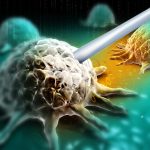Prostate Cancer
-
Treatment Lags Behind Guidelines for Many Men With Prostate Cancer
Guidelines for treating advanced prostate cancer changed in 2017, but a recent study indicated many patients were not being treated accordingly.
by Laura Gesualdi Gilmore
-
Forward Look
Mobilizing an Immune Response in Metastatic Prostate CancerA new approach that uses a probe to freeze tumor cells followed by an infusion of immune-boosting drugs shows promising results in an early clinical trial.
-
Healthy Habits
Plant PowerPlant-based diets may help people with prostate cancer reduce their risk for disease progression.
by Anne Danahy
-
Forward Look
Cognition and Prostate CancerAndrogen deprivation therapy, a common prostate cancer treatment, may increase cognitive difficulties.
by Joseph Jalkiewicz
-
Understanding How High and Low Testosterone Levels Can Treat Prostate Cancer
Using high-dose testosterone after prostate cancer stops responding to androgen deprivation therapy can stop tumor growth.
by Sandra Gordon
-
Forward Look
A More Targeted PARP InhibitorEarly research suggests treatment could have higher potency and less toxicity for people with BRCA-related cancers.
by Marci A. Landsmann
-
Living With Your Loved One’s Prostate Cancer
Christine Ledbetter on the ways her husband’s prostate cancer affected their relationship and finding support as a caregiver.
by Christine Ledbetter
-
Survivor Profile
Being Proactive About Prostate CancerBrian Jones applies lessons he has learned to help other Black men facing the disease.
by Suzanne McBride
-
Finding Answers in Prostate Cancer
PSMA PET imaging is helping clinicians more accurately stage prostate cancer and provide precision treatment.
by Sandra Gordon
-
More Prostate Cancer Patients Choose Surveillance
Men are increasingly opting to put off treatment for low-risk prostate cancer, and doctors say it’s a good thing.
by Kyle Bagenstose














